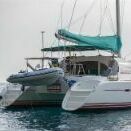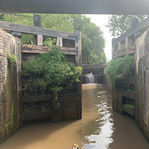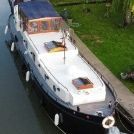Leaderboard
Popular Content
Showing content with the highest reputation on 31/08/17 in all areas
-
The whole thing is a minefield and while I'd rather none of this were an issue, it's vaguely comforting to see that other yards have the same challenges. One of our staff slipped off a customer's boat a few years ago resulting in a trip to A&E where an x-ray revealed small chip to the pelvis as well as extensive bruising. He was given a sick note and as this was technically a fracture we reported it under RIDDOR. The chap was back at work in a few days and life carried on as normal for a few weeks until an HSE inspector turned up fully intent on slapping prohibition notices on all our boats as they were dangerous slip and trip hazards. When she realised she couldn't (as the accident had been on someone else's boat) she spent a LONG afternoon time trawling through our paperwork and interrogating us in a hostile manner trying to catch us for something. We ended up with a minor slap on the wrist as we did not have a documented training procedure for teaching the hire boat cleaning staff how to step on to a boat, but do I want to go through that again? Hell no, hence we are reluctant to walk down some gunwales dragging a pump out hose or diesel hose, especially in the wet, likewise we don't handle coal or gas bottles onto/into other people's boats anymore. I wouldn't risk letting a customer do it themselves either as if they had an accident or a spillage it's still on my premises, so likely to be deemed my fault. That's not how I set out to run a business, but it's what we have to do now, and combined with the frequent abuse we get over our insistence that a credible diesel declaration is made, I suspect there will come a point where it becomes simpler to say "I'm sorry, we don't sell diesel/gas/pump out etc" any more." than explain (assuming we're given the opportunity) the myriad reasons why we appear to be being unhelpful about how it has to be done and still end up with a lousy review on here/Facebook/Google over something that is a tiny part of what we do. From a commercial standpoint there's not much money in diesel (and a lot of capital cost with the tank, pump etc), and by the time you've taken someone off another job, helped the customer moor up etc, and done all the paperwork you've lost 30 minutes so need to put a decent amount in the tank to make it worthwhile, yet frequently we used to have people stop who believed they were desperate for diesel, and we'd struggle to put 30 litres in before the tank was full - so now we have a minimum delivery of 50 litres. The internet has affected chandlery shops just as it has many other physical retailers. It was always a very seasonal business, but now the main demand is from passers by who have broken something, which doesn't provide enough stock turn to justify the amount we carry. Fortunately in our case it is also the stores for the hire fleet and all the repair work we do so it's worth having the stock but we don't have dedicated staff now, whereas 10 years ago we had two full time and one part time in there. It's also a factor that boat owners in general are less inclined to DIY than they used to be, and boats these days tend to use domestic fixtures and fittings.4 points
-
I wouldn't walk past £12 either. On the other hand, if there was a £20 note on the other side of the street and you didn't have time to get both.... A lot of it comes down to economies of scale: When we bought the business in 2006 it had a staff of nearly twice what it had now, and was heading for a cliff edge. I ignored the advice of two accountants and several other eminently qualified people who all said don't touch it with the proverbial pole and we got it straightened out just in time to endure the recession - whoopee. To become more efficient we had to change the priorities. I had (and still have) an excellent painter who was "wasting" half his week on hire boat turnrounds, so I sent him packing back into his shed where he was much happier, but he was the exception as the way forward for the rest of the business was to employ fewer people over time and make better use of the ones who were multi-skilled (and I mean skilled, not jack of all trades) and able to work on their own initiative, and anyone new who has come in has to meet that criteria. What this means now the chandlery no longer justifies full time staff is that the person who ends up doing the pump out (which could equally well be me) would almost certainly be earning the company more by doing something else. Locally you can earn £15/hr doing agency warehouse work, so it's a lot harder than it sounds to recruit someone on minimum wage to sweep up and mow a bit of grass until the next boat turns up - and I'm still searching for the holy grail of that productive task that can be done at random between pump out and diesel sales!3 points
-
Pretty much what I was implying a 'couple of pages ago'. I tend to find, in much of life, that whatever 'attitude' you present is the 'attitude' you receive.3 points
-
So the digs you've had at me ( and others) over the years are fine? Never mind. I'm sure I won't miss your "engagement" with me in the slightest.2 points
-
2 points
-
A pet elephant could provide a medium for transfering fuel from the pump to your boats filler. The pump attendant pumps fuel into a large bowl placed on the ground, from which the animal sucks it up into its trunk. With its trunk full up it then clomps across to your boat and at your command discharges its cargo of fuel into your orifice. Choose a beast with a nice long trunk that will reach the other side without it mounting your boat which might upset it. Lets name the pet elephant ''Tanker''. Their poo if dried in the hot summer sun and shaped into handy pats is good fuel for the stove too. They like to be rewarded with tons of cream buns. For more cream buns they will haul your boat along too, which they really prefer doing rather than keep suffering trunkfulls of diesel fuel which makes them sneeze. They can even make trunk calls, phoning ahead to notify fuel vendors of your approach.2 points
-
At a pinch you can buy a kitchen strainer (metal mesh)cut the handle & rim wire off & as tony says scrunch up enough to secure around the Carb top with a clip.2 points
-
Winkwell swing bridge does lift! It lifts 2" before it swings. So it is down2 points
-
This post cannot be displayed because it is in a forum which requires at least 10 posts to view.
-
1 point
-
Langley Mill Boatyard charge 80p per Litre domestic rate, because we have to make money. We know it's not the cheapest, but it doesn't make us much as we don't have the biggest tank so can't attract lower wholesale rates. We also do pump outs at £12, we don't include blue at that price. As a re-growing business, at the dead end of an 11 mile canal we have to price realistically, and we refuse to rip people off and use the "service station" principle. We won't imply a split on fuel, will fill either side of your boat, and will also serve with a smile, welcoming attitude, provide a thorough service and be transparent with costs throughout. It's difficult providing services with such small margins, but we see no difference between a pump out, blacking or major repair and treat all customers with the same respect. We look forward to welcoming you all to the only working boatyard on the southern Cromford Canal, Many have visited over the past 2 weeks on their way to the IWA festival of Water, and the Erewash has never been so popular, but there's still no queues at locks!! Dan1 point
-
I didn't. But he built his product the way he liked it and people bought them. Have you ever bought a car, the car makers build them the way they want to and you chose if you want one. same thing.1 point
-
I'll rephrase that. I wouldn't buy a boat from any guy with that attitude no matter how good his butlers were.1 point
-
Thanks Sir Nibble,Tony,Eeyore, and all okay when the relay arrives, I be back on. thankyou thankyou thankyou again the power of the forum col1 point
-
I wouldn't buy a boat from a guy with that attitude no matter how good the butler was.1 point
-
This post cannot be displayed because it is in a forum which requires at least 10 posts to view.
-
This post cannot be displayed because it is in a forum which requires at least 10 posts to view.
-
1 point
-
This post cannot be displayed because it is in a forum which requires at least 10 posts to view.
-
I'm sorry to hear that you have deduced we don't want your custom - selling diesel doesn't keep us in business so if we didn't want to offer the service we wouldn't. I don't see how our policy of not supplying under 50 litres of fuel can be viewed as an attempt to rip anyone off. Surely you must be aware that in almost all cases anyone who needs less than that effectively has a full tank and would be well advised to use up more of what they have anyway. Ironically, the only other place round here I can think of that sells toilet parts doesn't sell fuel, so you'd have to stop twice anyway - or possibly more than that until you find out who it is. I couldn't do a pump out for £15. Labour, chemical and disposal costs (we're on a septic tank so the disposal cost to us is about £10 per pump out by the time we've done a decent rinse) add up to more than that, so from a purely business sense perspective it makes no difference whether we do pump outs or not - it's just turnover. I must thank you though because you've caused me to redo an interesting exercise. You notional "shopping cart" of items adds up to about £145. I've just calculated after all the costs our clear profit is under £12 - any business analyst will tell you it should be three times that. Mind you the same analyst, based on margins alone would advise us to sell nothing but postcards!1 point
-
Never fitted one and I'm not a boat mechanic type. However we have just arrived at Barton and mooring for a week. Am around Friday, away for a few days then back here. If an extra pair of hands is needed give me a shout. Ian.1 point
-
I'd agree with that ^^, we've cruised a couple of times between Marsworth and Stoke Bruerne this summer and on our non-cruising days we've been passed by at least 20-30 boats a day, well except the rainy days. Wyvern must be laughing all the way to the bank with this summers proceeds; and only 3 of them have managed to "bump" into us so far this summer (no real damage done by any of them, thankfully) and none of them seemed overly intoxicated! All were very pleasant and ever so apologetic Noticed a fair few Napton hireboats down this way this year, definitely more than in the past couple of years.1 point
-
Personally, I would put them loosely in conduit or trunking, plus a few spares. That way you can easily add things that you forgot, and in the future can replace damaged cables by using the old one to pull in a new one as you pull the old one out (you tie the old one to the new one first, then pull).1 point
-
Note to self - don't stop for fuel at Rose because in all probability they: a. don't want my custom. b. will try to rip me off. (50 litre minimum sale) If I don't stop for fuel then I won't be stopping for the toilet seals & spray (£40+) and Nicholson's guide plus postcards I bought this summer. Edited to add:- and as I usually get fuel and a pump out together that's another £15 to £20 not taken. Makes good business sense to me!1 point
-
In my view that ammeter is better suited to a "boy racer" type setup, not accurately measuring charging current. I think that you need a digital one and you could do a lot worse than a battery monitor from the Nasa, Victron etc AS LONG AS YOU GRASP THE FOLLOWING: - These monitors will give accurate readings of Amps, Volts, and Amp hours OUT. They also purport to show the batteries state of charge, Ah left, time left and such like but in most boaters' hands these are nor much more than lies and cause premature battery failure. That will tell you when you can stop charging from the Amp flowing into the battery while the Smartguage will tell you when you should start charging to prevent battery damage. Even so you should recharge every day. How do we know what figures you put into Bimble calculator and what assumptions it made? Did you divide the inverter driven loads wattages by 10 rather than 12?. If not the calculation could be wrong. In any case I expect the power audit result to be expressed in Amp Hours not kWh. Sample calculations and charging/battery calcs to get a starting point on my website in the course notes. A 3000 Watt inverter means that you will have no need to limit the power of mains electric equipment you will gradually bring onto the boat and use. As long a such equipment is only used while the engine is running at speed and generating enough electricity to supply the loads then there is nothing wrong but as I explained at full output it will be drawing about 300 amps from the battery unless the alternator is covering it and that will go to a potentially damaging degree of discharge in about 20 minutes with fully charged batteries and far faster with old or partially discharged ones. You may well have it all sorted but experience here say the likelihood is that you do not. I suspect the large alternator probably has a 175 amp output if you are lucky. That would cover an AC load 1750 Watts, not 3000 Watts. Edited to add:- If you did draw 300 Amps for 20 minutes it will take many, many hours of charging to put that back into the batteries - think maybe 10 to 12 hours of engine charging or maybe 4 hours early in the day from the engine and the rest, in summer, from SIGNIFICANT solar. I will be blunt, as you tell us you will be CCing in winter without a shoreline your electrician is talking through his nether regions. Solar will NOT provide enough power during the winter and may not in poor weather in the summer so more than one person has advised as much solar as you can get on the boat or you can afford. Either that or plan to run your engine everyday for several hours OR buy a generator. No-one here has anything to gain by giving anything other than the best advice as they see iso have no reason to give bad advice. Modern Solar MPPT controllers do a regular equalise cycle and as standard this is set to about 14.8 volts for wet cells. However if it has a user setting then this could be set to 15 volts if that was required. It would not be good for any form of sealed cell battery to be equalised on a regular basis because it would drive waer off and they can not be topped up.1 point
-
This post cannot be displayed because it is in a forum which requires at least 10 posts to view.
-
Could be running engine tho whilst running a 3kw device, batteries don't get hit but the cables still count!1 point
-
This post cannot be displayed because it is in a forum which requires at least 10 posts to view.
-
Have you checked that 70mm cable actually fits the connections? It might be that they specify 2x50mm because 50mm is the max size that will fit. 70mm won't go on fire at 3kw but at 2 metres (4 meters round-trip presumably) you will get a fair bit of voltage drop at 3kw. Mind you, unless you intend to take 3kw from the inverter fairly often (and god save your batteries if you do!) then maybe it doesn't matter.1 point
-
No, he was not being humorous If it was a one-off I'd agree with you. But he has taken to lurking and firing the occasional snipe at me whenever he sees the opportunity. I don't know why - I have never attacked him or sniped at him. That is why I remain of the opinion that he is not a nice person.1 point
-
1 point
-
The poo from an elephant used regularly to transfer diesel should be more than "... good fuel for the stove"! Instant Fire-lighters would be nearer the mark!1 point
-
1 point
-
Definitely. It was the one glaring omission whatever solar setup/generator/travel power the OP needs.1 point
-
This post cannot be displayed because it is in a forum which requires at least 10 posts to view.
-
Or "My boats been really badly designed I'm afraid with the filler in a stupid place....I'm afraid you will have to hang off the off side to fill....."1 point
-
1 point
-
Unless you will have electric hook-up in the winter - or are intending cruising every day you really need to consider a 'Jennifer the Generator'. This will add between £2000 (Honda 2 Kw suitcase type, petrol) to £10,000 (built in diesel, water cooled, ultra-quiet 7-10Kw) to your fit out costs. The alternative is to sit with your engine running for 3 or 4 hours per day and not moving1 point
-
Each time I read this type of post from a soon to be or new boater and find no power audit figures have been given experience tells me it may all end in tears. Especially when I see a 3000 Watt inverter, unspecified "work top appliances" and no mention of other mains powered equipment like a hair dryer, iron, vacuum cleaner etc. If there are to be many mains appliances in use then you need to look at getting a large alternator that can power them via the inverter, a Travelpower system on the engine or a separate generator. A 3000Watt inverter at full output will draw about 300 Amps from the battery so with 440Ah of battery capacity that only gives you less than half an hour running from fully charged batteries. That sort of load is not very good for batteries. If you do not want to run the engine then the engine and alternator size are irrelevant as far as solar specifications go. Until we see your power audit any sizing will be a guess so until we get more info the answer must be "as much as you can afford or fit on the boat". Even so some times, even in summer, it will not be enough. Its more a question of looking at solar as a charging helper rather than the main source.1 point
-
You can't have too much solar IMHO. And fit an MPPT controller. You don't say whether you will be CCing or usually attached to shore power. 140 watts of solar won't be enough if you are living aboard and expect a usefull contribution to your electrical needs. We have 700 watts and find that provides most of our needs throughout the summer. Bear in mind that on cloudy days, your panel will produce a lot less power. To produce electricity off grid is going to be expensive, either by engine or genny, and is likely to cost you around £1 per hour as a rough ball park figure. Solar of course is free after the initial costs. Even if you are attached to shorepower, electricity still costs. I find that I only need to have the shorepower switched on for only an hour or two a day to run power hungry items such as immersion, washing machine, iron, etc. So even having shore power available, solar is still a very cost effective option. Having said that, solar will be pretty much useless for your needs in winter. Ken1 point
-
Well, we did the trip in six days, and very enjoyable it was too. Ratkatcher was great company and looked after me well, and we got Tichitoro to the boatyard in one piece. Basically we got there in six days by doing more hours per day than the original plan, because it suited both of us and with me to do the locks and some of the steering Ratkatcher was able to cope with the longer hours. The weather was very kind apart from a little rain on the last day, and unsurprisingly we found ourselves slowed down over the fine bank holiday weekend by the large number of boats on the move. There was a certain amount of queueing for locks involved. Due to a mysteriously random overheating problem we had to stop a few times for the water to cool down, but it's hoped that the skin tank to be fitted as part of the repair works might solve that trouble. After its major surgery Tichitoro should be back in the water for its return trip to the Shroppie in early October, not with me because I'm unavailable then, but there's crew lined up for that.1 point
-
This post cannot be displayed because it is in a forum which requires at least 10 posts to view.
-
I'm just using the VAT issues as an example of the way HMRC can behave. Section 3.6 of Notice 554 refers to the duty of care and says: If a customer refuses to make a declaration (even a verbal statement that they are commercial), we would expect you to exercise your RDCO duty of care and refuse to supply the fuel until they indicate their status as commercial or private. If they say they’re commercial, supply as above. If they insist they’re private but unwilling to make a written declaration you should refuse to supply the fuel unless they do so. You’re not responsible if a purchaser makes a false declaration. See paragraph 3.8 below if the customer claims that all of the fuel is for non-propulsion purposes. 3.8 says In recognition of their status, residential boat owners, whose primary, or often their only, place of residence is their boat, are allowed to purchase all of their fuel at the rebated rate. The specific reference in that section to residential there implies to me that if you are not "residential" than you cannot buy all your fuel at the rebated rate As for said fuel supplier, he was well known for selling at 100% domestic and cheerful and open in his disregard for HMRC - until they caught up with when life suddenly became very unfair. There was never any hint of any allegation that he had defrauded anyone by pocketing the duty. As you say, we cannot know the history of a visiting boat so we can only exercise caution to protect the business. If the owner of said boat disagrees with our stance then they can chose to move on and hopefully we part on friendly terms. I don't understand why some people get so upset if we can't agree terms. As in your marina there are a few residential boats on permanent moorings in our area to whom we are quite happy to supply at 100% domestic because we do know the history, and can easily put our case across should HMRC query it. We don't find selling in cans a problem - so long as the customer has a credible reason for buying the fuel i.e. generator, tractor, heating. So I'd suggest practical reasons (spill containment for example) might be the reason. We sell quite a bit of fuel in cans for all sorts - forklifts, gen-sets, a firm that hires bouncy castles, quite a lot of grounds maintenance companies, because we have a little bunded area to fill them in, but we shouldn't put fuel directly into machines (ie mini digger, chippers) as we can't contain spills from them properly. Water is actually easier to contain fuel on than on ground where it can soak in.1 point
-
1 point
-
In theory, anyone who accepts that the sails are the primary propulsion, but probably not many if they've ever dealt with HMRC. I don't agree with the philosophy of only supplying at 60/40 (it's tanatamount to forcing someone to sign a false declaration), but I can see why some people have gone down that route. I recall a routine VAT inspection at a major chandlers who had supplied a large amount of equipment to a chap doing a self-fitout. He had provided a letter from HMRC confirming that as a house boat the goods were zero rated. The VAT inspector was satisfied with the letter, but then asked for proof that the boat had actually been used as intended, which the owner of chandlery could not provide, and ended up paying the VAT on the goods. A boat builder I worked for built a community boat, again with the relevant paperwork confirming zero rated VAT status, but which several years later was not deemed to comply with the scheme. I never did find out all the finer points, but I know he ended up footing the bill as he had failed in his duty to collect the tax... I freely admit that those instances influence my judgement when deciding whether it might be better in the long run to turn business away, because I wouldn't put it past HMRC to demand proof from me that diesel I supplied had been used in the manner declared on an "odd" looking transaction. I know of one mobile fuel supplier who used to routinely supply at 100% domestic who they put out of business.1 point
-
That's a myth not helped by some poorly worded official looking advice. Here's what HMRC says: As an RDCO, you must take every reasonable precaution to make sure that your supplies of controlled oil (as defined in paragraph 1.5) are only to persons who will use that oil as permitted by the law. This is a legal obligation, imposed under Regulation 8 (2) of the Hydrocarbon Oil (Registered Dealers in Controlled Oil) Regulations 2002. If HMRC considers that you have failed in that obligation, they can take enforcement action against you, ranging from a variation of the conditions of your approval to a warning letter and, in more serious cases, withdrawal of your approval, civil penalties and even prosecution. So, put yourself in my position. A boat that isn't local turns up and wants to buy 30 litres of diesel at 100% domestic into his main engine tank. Would you risk the ongoing viability of your business or prosecution to save a complete stranger £5? I'd rather decline the business than loose the ability to buy red diesel to run our fleets. And HMRC DO check - we were inspected about 6 months into the new scheme, and our approach and record keeping was described as "exemplary".1 point
-
The problem is today, and its getting worse daily we get a portion of customers ( growing ) that don't understand that each business has their shall we say trading conditions which of course they are entiteled to and demand whatever they want whenever they want it. We now close at 4 we used to be 5 and we do a mere 5 day week now instead of the 7 days we did the last two years. We generaly start at 7 am and lock up by 5 pm so ok they are short days at only 10 hours and that means only a 50 hour week which for us is certainly part time but we sometimes get moaned at by employed 40 hours a week pratts who get short shrift. We also get dictated to about menu on occasion because we don't do vegan etc or gluten free or soya milk or etc etc etc. If you don't like it sod off somewhere that sells what you want no one can do it all properly, oh and yes we are busier again this year than last as the year before. In short a good business well run doesn't have to cowtail to all and sundry they just have to maintain good customer relations with the majority who understand the situation.1 point
-
The CRT licence was obviously written by a lawyer who was asked to make it as vague as possible. I'm so tempted to ask CRT on Facebook if they can provide a simple and clear licence rather than something that leaves you wondering if you can use their data... We suspect that Canalplan can't use the data because we run advertising and because we'd combine the CRT data with our own data and with data from Geograph, Facebook etc. so probably falls foul of paragraph b... but we're not totally sure...1 point
-
This post cannot be displayed because it is in a forum which requires at least 10 posts to view.
-
after Lurking for a while I thought I would make my first post on a subject close to my heart. I have been reading with interest the threads on mobile internet connection on Narrowboats, I have to declare an interest here as I work in the mobile industry so I probably have some bias here and there regarding networks ;-) . The problem I needed to solve was to be able to set up a reliable system that would allow me to work from “home” from our narrowboat, this means I needed to put a reliable system in place that has the best chance of working and not necessary the cheapest solution. After a lot of research and speaking to some of our technical design engineers who design mobile data solutions for emergency services they came up with a spec that seemed to me to be worth trying. My other requirement was that I would like to connect to static wifi services if available and then if that connection is not present to replace it with a 4g LTE connection and only is that is not available to switch to 3G . I then wanted the WAN connection to be repeated via a separate single wifi access point inside the boat to which our devices could then connect. The solution I settled on was an external mounted antenna on the roof which contains 5 separate internal antenna’s 2 MIMO for 4G/LTE/3G, two MIMO for WIFI and a single GPS aerial. This was then connected to a 12v router in the boat. And the router also had a separate 12v powered access point connected to it ( I needed 2 AP’s so I can separate the WAN connection from the Lan connection and therefore improve performance) The router had the capability for 2 separate SIMS so I went for a three sim as my main sim ( as the data plan is much cheaper) followed by an EE sim which I think gives the best overall coverage on the network ( but I am biased here, see disclaimer above). I then have 2-3 public and marina WIFI services that I subscribe to. For the roof mounted antenna its really important to make sure your aerial supports the frequency bands for the mobile operator you chose, make sure you check as a lot of the antenna don’t support all the UK 4G LTE frequency’s, and will not work so well if its not supported. Also try and find a router that will restart and set up when power is connected and is happy to switch off by having the power removed or switched off, again home 4G routers don’t like this behavior. Now I know that there have been discussions on using directional aerials and not omni directional ones, now whilst this works better for a TV and radio signal it is not necessary better for a wifi or Mobile data solution, trust me on this one but a good omni directional aerial will almost always work better than a directional aerial unless you can see the mobile mast , and if you can see it an omni will be fine J. Now the equipment I installed was as follows:- Antenna was a “MOBILE MARK LTM502 AERIAL WITH 4.5M LEADS” . Router was a “Pepwave max BR1 LTE” Internal access point was a “Pepwave AP One AC mini” My choice was based on the antenna being the best low profile multi antenna I could find in the UK that supports all UK 3G & 4G LTE frequencies, the router I chose because it is used by a lot of police forces to provide exactly this solution, it is also water and vibration resistant and will accept a wide range of supply voltages which removes the need for a separate 12v regulator, the AP choice was simply because the router can configure it so it made the setup and operation easier. You probably haven't heard of Pepwave much in the UK but in the US they are one of the market leaders in mobile Routers. Now I guess the feedback on how it works, well so far I have been running it for 4 months and it is working really well, I have rarely not had a working connection and it happy running all our laptops, tablets and phones etc. an added bonus is that the router also has a built in GPS which it can broadcast on the LAN which means that my laptop running WaterNAV also has a functional GPS inside the boat. So am I happy... yes I’m happy with the solution I have installed, as I said earlier its not the cheapest solution but if you must have a reliable connection then I would recommend you consider this type of setup.1 point
This leaderboard is set to London/GMT+01:00


























